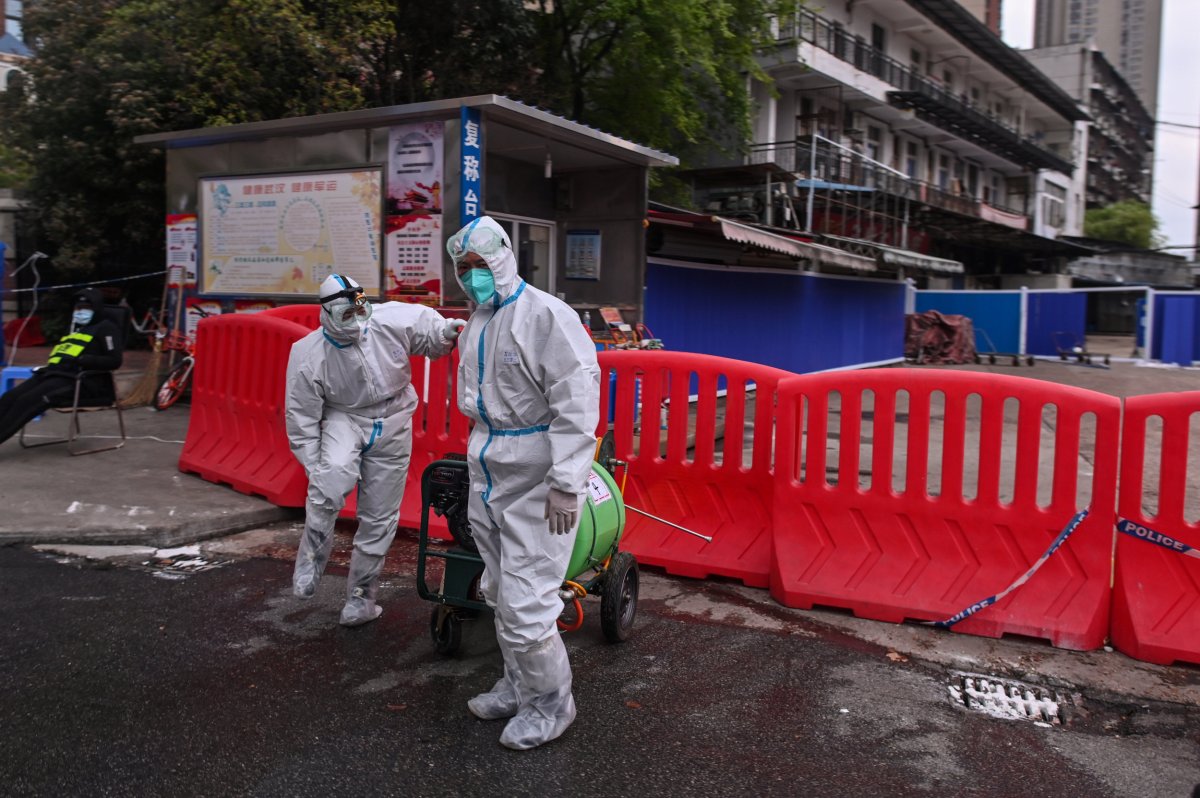A new perspective on the origins of COVID has been released in a report that suggests the earliest known case of the disease occurred at the Huanan Seafood Wholesale Market in Wuhan.
According to the report, the earliest confirmed case of COVID was a seafood vendor, whose illness started on December 11, 2019.
The study was written by Michael Worobey, head of the ecology and evolutionary biology department at the University of Arizona, and published in the journal Science on Thursday.
It goes against previous analysis that concluded the "earliest" COVID case was a 41-year-old male accountant who had no connection to the Huanan Market and lived 30 kilometers (18.6 miles) away, Worobey wrote.
That man's illness onset was reported as December 8, but Worobey's analysis of hospital records and interviews from the early stages of the pandemic showed that the December 8 illness was actually a dental problem and that the man's fever didn't start until December 16.
"His symptom onset came after multiple cases in workers at Huanan Market, making a female seafood vendor there the earliest known case, with illness onset 11 December," the report states.
Worobey concluded that the earliest symptomatic COVID cases were linked to Huanan Market, providing "strong evidence" that the pandemic has a live-animal market origin as opposed to a laboratory leak or otherwise.
He also pointed to the SARS coronavirus outbreak in 2003, in which there were "multiple independent jumps" of the virus from animals to humans due to live animal markets.
Worobey's new analysis appears contrary to a report from the South China Morning Post in March 2020 that stated the first confirmed case of COVID could have occurred as far back as November 17 in a Hubei resident aged 55, based on government data. Other proposed dates have been even earlier.
Praise and Criticism
Scientists have reacted to his report with praise and criticism.
Dr Angela Rasmussen, a virologist at the Georgetown University Center for Global Health Science and Security who is focusing on SARS-CoV-2, said on Twitter of Worobey's analysis: "There's been a lot of hand waving and water-muddying from random 'internet sleuths' who do this as a hobby, but this is what happens when a brilliant scientist specializing in pandemic pathogens and viral evolution decides to apply actual expertise to the sleuthing."
Joshua Powell, a molecular virologist studying inter-species transmission of influenza at the National Animal Disease Center, said the research was "articulate, factual, logical, and backed by solid phylogenetic data."
There’s been a lot of hand waving and water muddying from random “internet sleuths” who do this as a hobby, but this is what happens when a brilliant scientist specializing in pandemic pathogens and viral evolution decides to apply actual expertise to the sleuthing. https://t.co/qF5yRKPUaq
— Dr. Angela Rasmussen (@angie_rasmussen) November 18, 2021
Articulate, factual, logical and backed by solid phyolgenetic data. 👍 https://t.co/qkinnJqHGS
— Joshua D. Powell. Ph.D. (@joshpowellphd) November 18, 2021
But Richard Ebright, professor of chemistry and chemical biology at Rutgers University and a vocal critic of the natural origins narrative, cast doubt on the report: "Chinese news media reported verified cases in mid-November 2019, and Chinese scientific papers reported verified cases in [the] first week of December 2019," he tweeted in response to Worobey's study.
"No serious person claims the first cases occurred only in mid-December 2019."
Chinese news media reported verified cases in mid-November 2019 (https://t.co/NT3VrpkgLg), and Chinese scientific papers reported verified cases in first week of December 2019 (https://t.co/SwUoLCGAgy).
— Richard H. Ebright (@R_H_Ebright) November 19, 2021
No serious person claims the first cases occurred only in mid-December 2019.
And Alina Chan, a molecular biologist at the Broad Institute of MIT and Harvard, criticized a lack of November case data. She tweeted: "This is like trying to guess the shape of an iceberg when you can only see what's above the surface.
"We know that by December there had been a superspreader event at the seafood market and cases numbered in the hundreds."
She also pointed to a lack of data from Wuhan from the early days of the pandemic and called for a secure whistleblower channel to be set up.
"We can't blame people in China for being unable to tell us what they know. It can have dire consequences for them," she tweeted.
Anyone who can do basic math knows there's no way Covid cases were only recognized after 27 Dec 2019, if nearby markets were ordered to shut down on 23 Dec and the authorities already had the virus genome on 27 Dec. pic.twitter.com/uXiox4vguK
— Alina Chan (@Ayjchan) November 18, 2021
The origins of the COVID pandemic are still unknown. Critics of the World Health Organization's investigation earlier this year, which concluded a lab-leak scenario was "extremely unlikely," said the inquiry lacked access to data.
Since then the lab-leak scenario has been considered by prominent scientists and was inconclusively investigated by a U.S. intelligence team put together by President Joe Biden.

Uncommon Knowledge
Newsweek is committed to challenging conventional wisdom and finding connections in the search for common ground.
Newsweek is committed to challenging conventional wisdom and finding connections in the search for common ground.
About the writer
To read how Newsweek uses AI as a newsroom tool, Click here.








